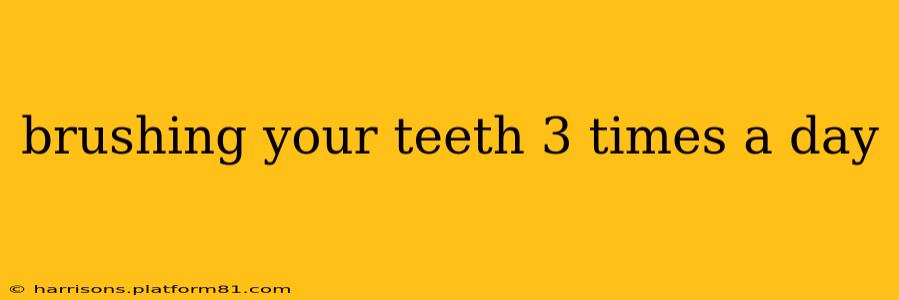Brushing Your Teeth Three Times a Day: Is It Necessary?
Brushing your teeth is a cornerstone of good oral hygiene, but is brushing three times a day truly necessary, or even beneficial? The short answer is: it depends. While the standard recommendation is twice a day, for some individuals, three times might be advantageous, while for others, it could even be detrimental. Let's delve into the details to help you determine the best brushing frequency for your specific needs.
Is brushing three times a day better than twice a day?
This is a common question, and the answer isn't a simple yes or no. Brushing twice a day, for two minutes each time, effectively removes food particles and plaque, preventing cavities and gum disease. Adding a third brushing session might provide additional benefits for certain individuals, such as those with:
- High-sugar diets: Frequent sugar consumption significantly increases the risk of cavities. An extra brushing session after sugary snacks or drinks can help neutralize acids and minimize damage.
- Dry mouth: Individuals experiencing dry mouth (xerostomia) often benefit from more frequent brushing as saliva plays a crucial role in neutralizing acids and protecting teeth. However, be cautious; over-brushing can irritate already sensitive gums.
- Specific dental conditions: Individuals with certain dental conditions or those recovering from dental procedures might be advised by their dentist to brush more frequently. Always follow your dentist's specific recommendations.
However, brushing too often can lead to problems:
- Gum recession: Aggressive brushing, even if infrequent, can damage gums. Three times a day increases the risk of gum recession if technique isn't perfect.
- Tooth enamel erosion: Over-brushing can wear down tooth enamel over time, making teeth more sensitive and susceptible to decay.
- Increased sensitivity: Frequent brushing, particularly with abrasive toothpastes, can increase tooth sensitivity.
What are the benefits of brushing twice a day?
The American Dental Association (ADA) recommends brushing twice a day, for at least two minutes each time, using fluoride toothpaste. This practice effectively removes food particles and plaque, the sticky film that harbors bacteria. Consistent twice-daily brushing significantly reduces the risk of:
- Cavities: Plaque produces acids that erode tooth enamel, leading to cavities. Regular brushing removes plaque, preventing acid buildup.
- Gum disease (gingivitis and periodontitis): Plaque buildup can irritate gums, causing inflammation (gingivitis). If left untreated, it can progress to periodontitis, a severe infection that damages gums and bone.
- Bad breath (halitosis): Bacteria in plaque contribute to bad breath. Regular brushing helps eliminate odor-causing bacteria.
How often should I brush my teeth?
The ideal frequency depends on your individual needs and lifestyle. For most people, brushing twice a day, once in the morning and once before bed, is sufficient. However, individuals with specific risk factors, as mentioned above, might benefit from brushing three times a day. It’s crucial to prioritize proper brushing technique over frequency. Gentle, thorough brushing is key to preventing damage.
What is the best time to brush my teeth?
Brushing before bed is particularly important as it removes food particles and plaque that have accumulated throughout the day, minimizing bacterial activity while you sleep. Morning brushing helps remove any overnight plaque buildup and freshen your breath. Adding a third brushing session after meals or snacks high in sugar is advisable for those at increased risk of cavities.
Can brushing too much damage my teeth?
Yes, over-brushing can indeed damage your teeth and gums. Excessive brushing can lead to enamel erosion, gum recession, and increased tooth sensitivity. Focus on gentle, thorough brushing using proper technique rather than increasing the frequency unnecessarily.
Ultimately, the optimal brushing frequency is a personal matter. Consulting your dentist is the best way to determine the ideal routine for your unique oral health needs. They can assess your individual risk factors and provide personalized recommendations to maintain optimal oral health. Remember, proper technique is paramount, regardless of how often you brush.
